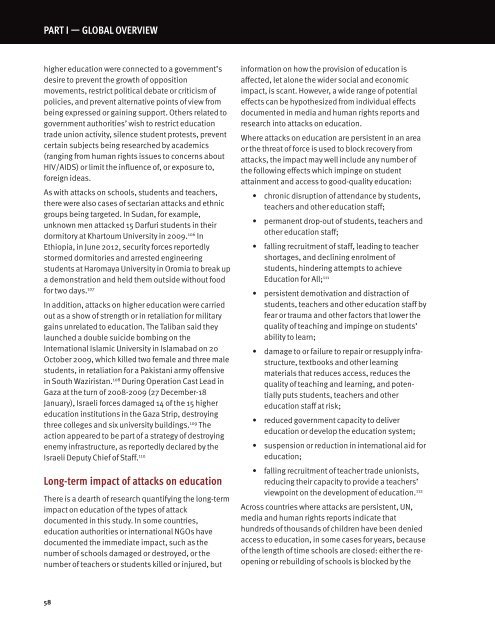eua_2014_full.pdf?utm_content=buffer4a392&utm_medium=social&utm_source=twitter
eua_2014_full.pdf?utm_content=buffer4a392&utm_medium=social&utm_source=twitter
eua_2014_full.pdf?utm_content=buffer4a392&utm_medium=social&utm_source=twitter
- No tags were found...
Create successful ePaper yourself
Turn your PDF publications into a flip-book with our unique Google optimized e-Paper software.
PART I — GLOBAL OveRvIeWhigher education were connected to a government’sdesire to prevent the growth of oppositionmovements, restrict political debate or criticism ofpolicies, and prevent alternative points of view frombeing expressed or gaining support. Others related togovernment authorities’ wish to restrict educationtrade union activity, silence student protests, preventcertain subjects being researched by academics(ranging from human rights issues to concerns aboutHIV/AIDS) or limit the influence of, or exposure to,foreign ideas.As with attacks on schools, students and teachers,there were also cases of sectarian attacks and ethnicgroups being targeted. In Sudan, for example,unknown men attacked 15 Darfuri students in theirdormitory at Khartoum University in 2009. 106 InEthiopia, in June 2012, security forces reportedlystormed dormitories and arrested engineeringstudents at Haromaya University in Oromia to break upa demonstration and held them outside without foodfor two days. 107In addition, attacks on higher education were carriedout as a show of strength or in retaliation for militarygains unrelated to education. The Taliban said theylaunched a double suicide bombing on theInternational Islamic University in Islamabad on 20October 2009, which killed two female and three malestudents, in retaliation for a Pakistani army offensivein South Waziristan. 108 During Operation Cast Lead inGaza at the turn of 2008-2009 (27 December-18January), Israeli forces damaged 14 of the 15 highereducation institutions in the Gaza Strip, destroyingthree colleges and six university buildings. 109 Theaction appeared to be part of a strategy of destroyingenemy infrastructure, as reportedly declared by theIsraeli Deputy Chief of Staff. 110Long-term impact of attacks on educationThere is a dearth of research quantifying the long-termimpact on education of the types of attackdocumented in this study. In some countries,education authorities or international NGOs havedocumented the immediate impact, such as thenumber of schools damaged or destroyed, or thenumber of teachers or students killed or injured, butinformation on how the provision of education isaffected, let alone the wider social and economicimpact, is scant. However, a wide range of potentialeffects can be hypothesized from individual effectsdocumented in media and human rights reports andresearch into attacks on education.Where attacks on education are persistent in an areaor the threat of force is used to block recovery fromattacks, the impact may well include any number ofthe following effects which impinge on studentattainment and access to good-quality education:• chronic disruption of attendance by students,teachers and other education staff;• permanent drop-out of students, teachers andother education staff;• falling recruitment of staff, leading to teachershortages, and declining enrolment ofstudents, hindering attempts to achieveEducation for All; 111• persistent demotivation and distraction ofstudents, teachers and other education staff byfear or trauma and other factors that lower thequality of teaching and impinge on students’ability to learn;• damage to or failure to repair or resupply infrastructure,textbooks and other learningmaterials that reduces access, reduces thequality of teaching and learning, and potentiallyputs students, teachers and othereducation staff at risk;• reduced government capacity to delivereducation or develop the education system;• suspension or reduction in international aid foreducation;• falling recruitment of teacher trade unionists,reducing their capacity to provide a teachers’viewpoint on the development of education. 112Across countries where attacks are persistent, UN,media and human rights reports indicate thathundreds of thousands of children have been deniedaccess to education, in some cases for years, becauseof the length of time schools are closed: either the reopeningor rebuilding of schools is blocked by the58


